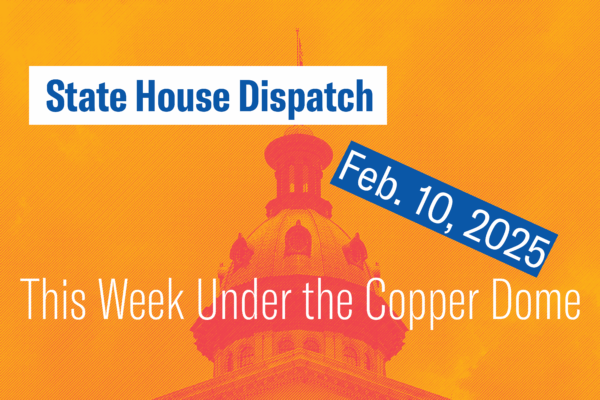These are the bills and legislative hearings we’re watching at the South Carolina State House for the week of February 10, 2025:
Another attack on trans youth and their families
This Thursday morning, lawmakers will discuss a bill that would harm transgender youth. If you would like to testify, please join us at the Senate Child Welfare Subcommittee meeting on Thursday, Feb. 13 at 10 a.m. in Room 307 of the Gressette Building (1101 Pendleton St., Columbia). The hearing has already been rescheduled once this week, so be sure to check the Senate Meeting Schedule for updates.
Senate Bill 240 would direct courts and state agencies to give preferential treatment to parents, guardians, and foster caregivers who adhere to state-enforced, non-scientific definitions of gender and sex by denying the existence of transgender and gender-nonconforming children. In custody, abuse, and foster placement cases, state agencies would be required to consider it a “positive factor” when adults force children to comply with a state-enforced definition of “biological sex.”
S. 240 is similar to H. 3094, which was filed in the House in January. It would endanger trans kids and open the door for harmful practices like conversion therapy, which the American Medical Association has condemned as unethical and discriminatory.
Our coalition partners at South Carolina United for Justice & Equality have created a form to help you get started writing letters to lawmakers in opposition to this bill:
New abortion ban in the works
On February 6, Sen. Richard Cash of Piedmont introduced an extreme abortion ban bill, S. 323. In addition to banning abortion before the current “fetal heartbeat” cutoff and setting a 30-year prison sentence for those found guilty of “aiding and abetting,” the bill would delete exceptions for survivors of rape and incest as well as exceptions for pregnancies with a fatal fetal anomaly. This bill would put people in danger and force them to give birth in horrifying circumstances.
The bill was referred to the Senate Medical Affairs Committee but has not been scheduled for a hearing yet. Committee members and their contact information are available here.
Most South Carolinians do not support a 6-week abortion ban, let alone a total ban like Sen. Cash has proposed. Medical experts have testified that existing bans are already endangering lives by making it harder to obtain safe, legal abortions, as well as contributing to a brain drain in South Carolina’s medical field. One reason why extreme, unpopular legislation is advancing is that state lawmakers have gerrymandered “safe” partisan districts, meaning that the outlier opinions of primary voters ultimately determine who holds office.
We all need to show up and speak out against attacks on bodily autonomy and medical care access. If you would like to help spread the word about the ongoing harms of the existing abortion ban, Episode 4 of the While I Breathe podcast features an OB/GYN and a married couple talking about the ways the law has harmed them.
Diversity, Equity, and Inclusion under attack
The latest bill targeting programs of diversity, equity, and inclusion (DEI) is House Bill 3927, introduced on February 6 with 69 sponsors in the State House of Representatives. This bill would forbid DEI programs in all state agencies, K-12 public schools, colleges, and universities.
This time, lawmakers are defining DEI programs as ones that “promote policies or procedures designed or implemented in reference to race, sex, color, ethnicity, gender, or sexual orientation for any purpose other than ensuring compliance with any applicable court order or state or federal law.” This is a broad prohibition that could endanger everything from medical research to teacher recruitment and training programs.
This bill is similar to another one introduced this session that would threaten to slash funding at colleges and universities (H. 3572) and another that targets both K-12 and higher education (H. 3219). Because this bill has more sponsors, including influential committee leaders, we anticipate this one may get a hearing soon in the House Committee on Education and Public Works. You can check the committee website to see who sits on this committee and reach out to lawmakers from your area.
If you are interested in getting more involved in the fight for academic freedom, consider filling out our Volunteer Interest Form and letting us know which issues matter to you most. Members of our Advocacy team will be in touch with opportunities to show up and engage in the fight:
Private school vouchers on the move
Last week the Senate passed a bill (S. 62) to divert state funds from the education lottery to private K-12 schools, including religious ones. It now passes to the House, where it has been assigned to the Committee on Education and Public Works.
The bill has not been scheduled for a House committee hearing yet, but we anticipate a few sticking points in the upcoming debate. For one, some House Republicans will push to make the program universal, meaning that it would subsidize private school tuition for even the wealthiest families.
Another fault line that we have seen in other states that experimented with vouchers is that rural voters, including Republicans, largely oppose private school vouchers because they disproportionately harm the budgets of rural public schools. To quote from Prof. Josh Cowen on a recent episode of our podcast about the pitfalls of vouchers:
“It’s rural voters who can’t stand these voucher schemes and have kept these things out of becoming law ... It’s Republican opposition by members who represent rural communities.”
If you have not already written to your lawmakers about the harms of school vouchers, The South Carolina Education Association has a form to help you get started:
For more information, listen to Episode 12 of While I Breathe and see our blog post, “The ugly truth about school vouchers.”


